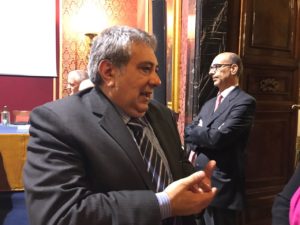Rome (NEV), December 30, 2017 – On December 22nd the first group of 162 sub-Saharan refugees arrived in Rome from Libya: they landed at the military airport of Pratica di Mare with a State flight organized by the Ministry of the Interior in the form of what they called a “humanitarian corridor” (whereas technically it is a resettlement). The Italian Bishops’ Conference (CEI) is involved in the welcoming action and, on arrival, the Minister of the Interior, Marco Minniti, was present.
Awtsane, 21 days old, was born. In a detention center in Libya. Tonight he reached safety with his mother after having been evacuated from Libya to Italy @refugees @refugeesmedia pic.twitter.com/yCSLZ0RsWz
— UNHCR Italia (@UNHCRItalia) December 22, 2017
These refugees were evacuated to Italy with a title that recognizes them “international protection”, that is to say that their situation has already been assessed by the UNHCR in Libya; a different procedure from that of the “humanitarian corridors” project promoted by the Federation of Protestant Churches in Italy (FCEI), the Waldensian Board and the Community of Sant’Egidio. In fact, those taking part in this project are refugees who arrive in Italy with a “humanitarian visa” and apply for asylum as soon as they arrive in Rome-Fiumicino airport by a regular civil flight. But beyond the technical differences, it is a fact that the Ministry of the Interior has defined that what occurred on 22nd December last, as a “humanitarian corridor”, resuming the term adopted for the ecumenical initiative that has already brought to Italy from Lebanon a thousand refugees in conditions of vulnerability and which will continue for the next two years.

“We welcome this arrival with great satisfaction – commented Paolo Naso, coordinator of the Mediterranean Hope – FCEI refugees and migrants Program – because it supports and develops the good practice that the Italian Protestants and the Community of Sant’Egidio started two years ago. And the fact that this time the refugees come from Libya, shows once again that the model launched by Christian communities has its own functionality and its logic that politics have resumed. In this case the action of the churches paved the way for politics – concluded Naso – and gives the measure of what Christians can do together for those who suffer and knock on our door. Now it is a matter of transforming a great gesture of Christmas goodwill in a large-scale policy and with much more important numbers: too many testimonies agree in defining Libya as hell and our Italian and European consciences can not ignore this”.





























